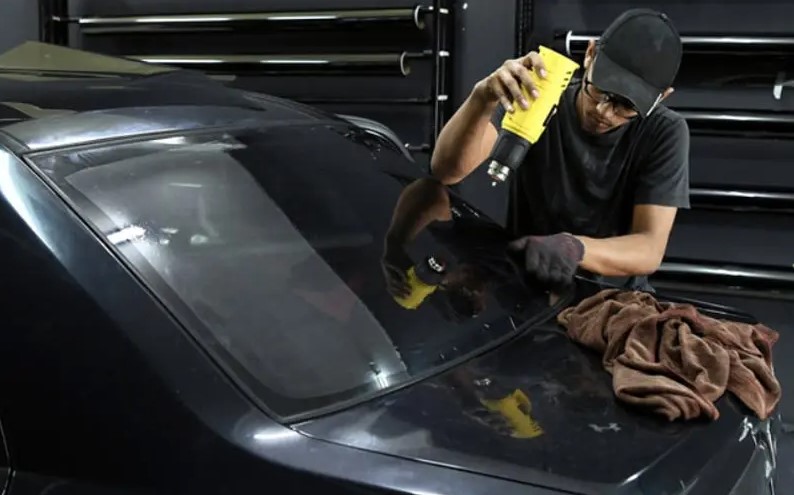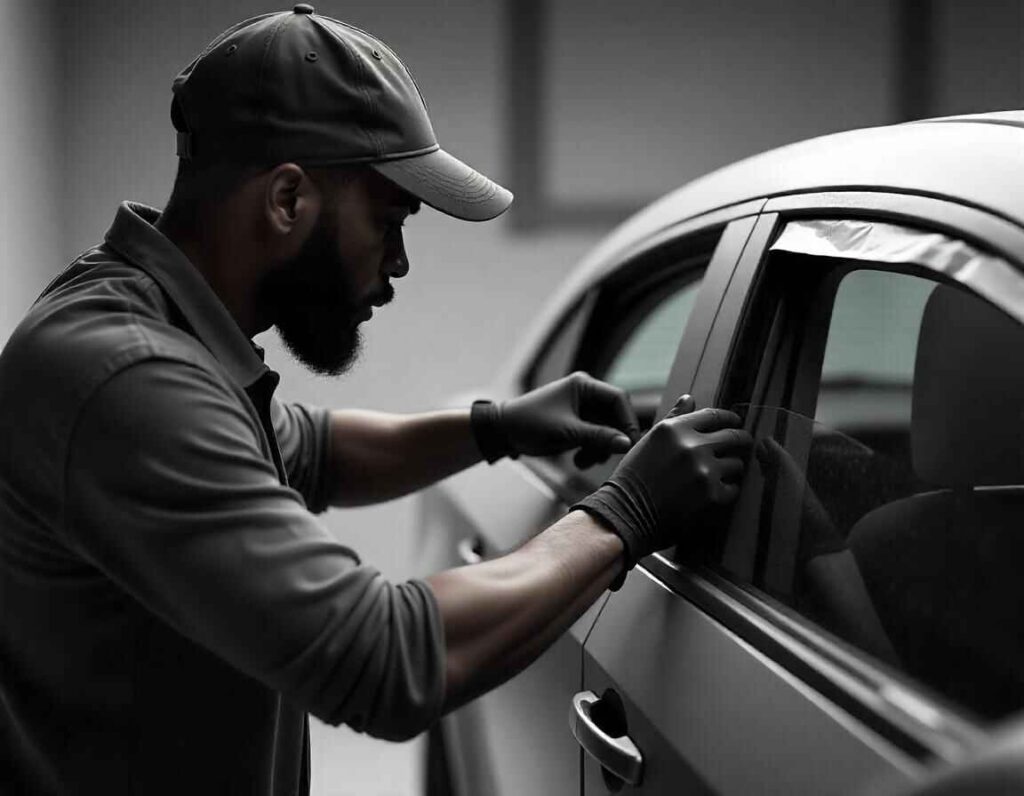Car window tinting is a popular upgrade for vehicle owners looking to improve the aesthetics, comfort, and privacy of their cars. While the concept might seem simple, there’s much more to window tinting than meets the eye. In this guide, we’ll break down everything you need to know about window tint: from its benefits and types to installation tips and legal considerations.
Let’s dive into the world of car window tinting to help you make an informed decision for your vehicle.
Introduction to Car Window Tinting
If you’ve ever noticed a sleek-looking car with darkened windows, you’ve probably thought about getting window tint for your own vehicle. It’s a simple modification that offers various benefits, from improving your car’s aesthetics to making it more comfortable. But, before you rush into getting window tint, it’s essential to know exactly what it is, how it works, and whether it’s the right choice for your vehicle.
What is Car Window Tint?
At its core, window tint is a thin film applied to the interior or exterior of a car’s windows. This film comes in various shades and materials, which block out a certain percentage of light from entering the car. The main purpose of car window tint is to reduce glare, heat, and harmful UV rays, while also providing a sense of privacy for the occupants.

Why Do People Tint Their Car Windows?
Privacy and Security
One of the most common reasons for applying car window tint is privacy. Tinted windows make it harder for outsiders to see into the car, giving passengers a sense of security. Additionally, this privacy can help protect valuable items left in the car by making them less visible to potential thieves.
UV Protection
The sun’s ultraviolet (UV) rays can be incredibly harmful, not only to your skin but also to your car’s interior. Over time, UV rays can cause your car’s upholstery to fade and deteriorate. By installing car window tint, you can block up to 99% of UV rays, which helps protect both your skin and your car’s interior.
Heat Reduction
Have you ever opened your car door after it’s been sitting in the sun, only to be hit by a wave of intense heat? Car window tint can drastically reduce the amount of heat that enters your vehicle, making it much cooler and more comfortable, especially during the hot summer months.
Types of Car Window Tint
Dyed Window Tint
Dyed window tint is among the least expensive choices you can find. It works by using multiple layers of dye to absorb sunlight, reducing heat and glare. While it offers excellent privacy, its heat reduction capabilities may not be as strong as other types of window tint.
Metalized Window Tint
This type of window tint contains tiny metallic particles that reflect sunlight, which helps reduce heat and glare. Metalized tints are more durable and can strengthen your windows, making them shatter-resistant. However, they may interfere with cell phone signals and radio reception.
Ceramic Window Tint
Ceramic tints are considered top-of-the-line in the world of window tint. They block a significant amount of UV rays and heat without affecting your visibility or electronic signals. While ceramic tints are more expensive, their superior performance and durability make them a popular choice among car enthusiasts.
Hybrid Window Tint
Hybrid tints merge the advantages of both dyed and metalized tints. This type of window tint offers a balance of privacy, heat reduction, and durability without the interference issues associated with metalized tints.

How Car Window Tint Works
Car window tint works by using various materials to either absorb or reflect sunlight. The tint film contains compounds that filter out specific light wavelengths, reducing the amount of heat and UV rays that pass through the windows. The darker the tint, the more light is blocked, but each type of window tint has different light-blocking properties.
Benefits of Car Window Tinting
Enhanced Privacy
The primary benefit of window tint is the added privacy. Whether you’re driving or parked, tinted windows provide a shield from prying eyes.
Protection from UV Rays
Another critical benefit of window tint is the protection it offers from harmful UV rays. This is especially important for people who spend long hours driving or live in sunny regions.
Improved Vehicle Aesthetics
Let’s face it – tinted windows just look cool. Installing window tint can give your vehicle a sleek, sophisticated appearance.
Cooler Interior Temperatures
By blocking out heat-producing sunlight, car window tint helps maintain a more comfortable temperature inside your vehicle, reducing the need for air conditioning.
Car Window Tint and UV Protection
Not only does car window tint keep your car cooler, but it also helps shield you from harmful UV radiation. Long-term exposure to UV rays can cause skin cancer, but a high-quality car window tint can block nearly 99% of these rays, keeping you and your passengers safe.
The Impact of Car Window Tint on Heat Reduction
The primary function of car window tint is to reduce heat inside the car. The tint acts as a barrier, preventing excess heat from entering the vehicle and ensuring a more comfortable ride, even in scorching weather.
Is Car Window Tint Legal?
Understanding Tint Laws by State/Country
Before getting your windows tinted, it’s crucial to check the local laws. Different regions have varying regulations on car window tint, including how dark the tint can be and which windows can be tinted.
Penalties for Illegal Tinting
If your car window tint exceeds the legal limit, you could face fines, and in some cases, you may be required to remove the tint.

Selecting the Best Window Tint for Your Car
Tint Percentages Explained
When choosing car window tint, you’ll often hear terms like “5% tint” or “20% tint,” which refer to the amount of visible light transmission (VLT). A lower percentage indicates a darker tint.
Selecting the Right Tint Based on Climate
If you live in a hot climate, you might want to opt for a car window tint with a high heat-rejection rate. Conversely, if you live in a colder area, a lighter tint may suffice.
DIY vs. Professional Car Window Tinting
Advantages of Professional Installation
While DIY kits for window tint are available, professional installation ensures the best results. Experts know how to apply the tint smoothly and without bubbles, ensuring a flawless finish.
Pros and Cons of DIY Tinting
While DIY kits are cheaper, they can be tricky to apply correctly. Improper installation may result in bubbling or peeling over time.
How to Maintain Your Car Window Tint
Cleaning Tips for Longevity
To keep your window tint looking great, it’s important to clean it gently. Use a mild, ammonia-free cleaner and a soft cloth to avoid damaging the tint.
Avoiding Damage to the Tint
Be cautious when using sharp objects near your tinted windows. Even a minor scratch can cause the tint to peel or degrade over time.
Typical Errors to Steer Clear of When Tinting Car Windows
Over-tinting
Going too dark with your window tint can result in reduced visibility and potential legal issues. Always check local regulations before deciding on a tint level.
Choosing the Wrong Type of Tint
Not all window tints are created equal. Be sure to choose a type of tint that suits your driving habits, climate, and budget.
How Much Does Car Window Tinting Cost?
Factors Influencing the Price
The cost of window tint can vary depending on the type of tint, the size of the vehicle, and whether you choose a professional or DIY installation.
Conclusion
Installing car window tint is a great way to enhance your car’s privacy, protect yourself from harmful UV rays, and keep your vehicle cool. By understanding the different types of tints available and knowing how to maintain them, you can enjoy the benefits of tinted windows for years to come.
FAQs
- Is car window tint legal?
It depends on where you live. Be sure to check your local laws before getting your windows tinted. - Does car window tint affect visibility at night?
A very dark car window tint can reduce visibility at night, so it’s important to choose a tint level that suits your driving conditions. - Can I tint my windows myself?
However, for optimal results, professional installation is advised. - How long does car window tint last?
A high-quality car window tint can last anywhere from 5 to 10 years, depending on the type and maintenance. - Does car window tint block UV rays?
Yes, most types of car window tint block up to 99% of harmful UV rays.
